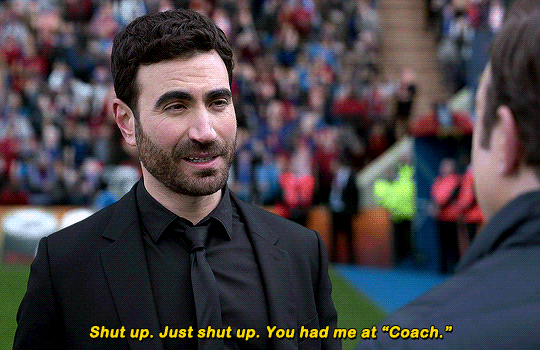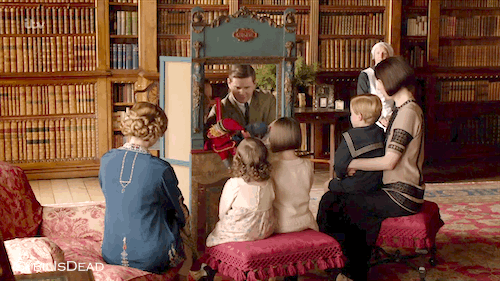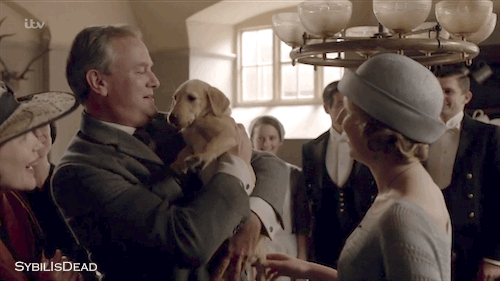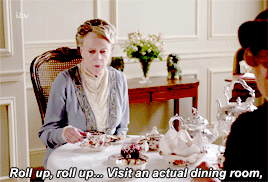“Christmas Special”
Original Airdate: March 6, 2016
There have been some things I haven’t liked about Downton Abbey, but the good has always outweighed the bad. This episode? It was all good. This was the show at its finest, and everything I wanted to expect but was afraid to. Everyone was happy in the end, and perhaps there was a huge amount of joy and love going on there, but I’m an optimistic person, and besides, this episode ended with the holidays. The episode didn’t promise smooth sailing for all the characters from here on out. It ended on a happy moment in many of their lives, and the start of a new chapter for everyone. Even the house was starting a new chapter of its long life. Like the end of a good book, everything was wrapped up but not completely over. This story was over because we had followed the family through this stage of their lives, and now they are embarking on a new one.
I really do hope that we get a Downton movie someday, as long as there isn’t death and destruction in the plot. I wouldn’t want anyone to mess with this ending, because this was as close to perfect as a series finale can get, especially one for a show with plenty of life left in it.
The episode began with the whole family setting off to have a picnic (i.e. a table with crystal glasses and footmen) on the grounds, and any scene that involves Lord Grantham playing with his grandchildren earns an A+ in my book. In fact, expand that to include any scene where anyone plays with their children. Tom and Henry letting the children “work” in the agent’s office was adorable. I love that, throughout the episode, Henry is playing with George. I didn’t care that much for his character in the past, but the fact that he’s stepping into his role as stepfather, and treating Edith kindly, helps. Maybe he can help to build a bridge between the two (in the hypothetical future we don’t get to see). Meanwhile, Edith decided to move to London, work on her magazine, and enroll Marigold in school. But things were about to change...
THE HAPPY ENDING (FINALLY)
While on a trip to London, Edith meets Rosamund at the Ritz for dinner... but as they were led to their table, Bertie appeared, and Rosamund quickly jumped ship. Mary set the whole thing up, booked the table, and contacted Bertie. Later on Mary is kind of blasé about the whole plan, but somewhere in there was one of the best things Mary has ever done (with a little nudge and pointed look from the Dowager).
Bertie quickly made himself very clear: he wanted to get back together. Edith, however, was more than cautious. She almost had a grudge against him. I think she was less angry at him for breaking her heart than she was scared of getting her heart broken yet again. She wasn’t going to run right back to him just because he said he had changed his mind. She wasn’t going to set herself up for the fall again that quickly. Bertie begged. His voice cracked. He looked about to burst into tears while the waiters interrupted them (both Laura Carmichael and Harry Hadden-Paton deserve a huge round of applause for this scene). He said he was prepared for gossip and the possibility of his mother finding out about Marigold — none of it mattered if they were happy together.
Robert and Cora were beyond thrilled to hear the engagement was back on. They went to Bertie’s castle, which was more like a palace or a small kingdom. They’d been impressed by it when they went to visit Rose’s in-laws, but now, they looked on it with a new level of awe. Bertie’s mother made it pretty clear that she was in charge.
And what did Edith do? She let his mother be in charge of her own fate. Without Bertie’s prior knowledge, Edith went to her and confessed everything about Marigold. Bertie then defended Edith’s actions after he found out about their meeting. Edith coming clean showed her character more than anything else she could have done. Bertie’s mother needed a perfectly aimed comment from Robert at dinner, but finally she came to accept Edith. I think that from the moment Edith told her the truth, she had gained a respect for Edith that didn’t necessarily guarantee her approval, but paved the way for it. Edith’s choice showed her character growth, but also highlighted why Edith, of all people, needed a happy ending. Her happiness was in sight, finally, after so many disappointments and heartbreaks, and she risked it all in the name of honesty.
NEW JOBS AND BEGINNINGS (DOWNSTAIRS)
Thomas found a new job and decided that when he started, he wanted to be a new man. The first step was thanking Baxter, Anna, and Andrew for saving his life. The second was saying goodbye to the family (and those going with the family to Bertie’s). The third, saying goodbye to the horde of characters who turned out for his send-off. So many people! Major props to Rob James-Collier for so naturally turning Thomas into person who shoots everyone warm (balanced with just the right hint of embarrassment) smiles and tears up when someone — or himself — says something kind. It seemed like the end of the road for this storyline, and if we had never seen the conditions of his new job, it could have been.
Then we found out what a snooze-fest his new job was. His new lord and lady were approximately ninety years old, and he was one of three servants. Dinner was about as dull as watching paint dry. No arguments, Dowager snark, or blood-spewing here.
Meanwhile, the schoolmaster approached Molesley and Baxter in the village and offered the former a teaching position and a cottage to live in. Molesley couldn’t manage anything more than a squeak, so Baxter piped up and spoke for him. That’s what she does. That what she did for Thomas – she believed in him when he didn't believe in himself. She builds people up. Thomas decided to turn the tables and as a parting gift, told her to put her past behind her and not let the man who ruined her life hold any power over her. So she did just that. She told Molesley that she was moving forward, and he decided to do the same. He took the job, with the promise of coming back as a second footman for special occasions, and to keep in touch with her. That was one thing – one of the few things – I wished was different about this episode. It was hinted that they would end up together, but I would have loved a proposal.
In the kitchen, Daisy and Andy had a whole love story over the course of one episode, which was rushed but not too forced (Mrs. Patmore stated that Daisy’s aversion to Andy was the same as her aversion to Alfred after he realized he liked her. But I don’t completely see that. At that point, she had moved on from Alfred). She decided to give herself a haircut (never a good idea in the world of television), and after Anna fixed it, she chose to move in with Mr. Mason. And presumably, in the future, with Mrs. Patmore. I love the idea of Daisy’s father-in-law and the woman who has been like a mother to her being one happy family. They can all farm pigs and cook together. I’d watch that spinoff.
During the wedding reception, Anna went into labor in Mary’s room. For once, the roles were reversed, and Mary took care of her maid. Bates and Anna holding their baby boy, sitting on Mary’s bed as the New Year came in, was a poetic shot. Finally, after all the angst these two have had. I’m glad their storyline was a quiet, happy one this season. Also, Baby Bates will be kept in the nursery with the children during the day, and that's lovely.
The other one real issue I have with this episode is Carson’s illness. His hands started shaking until he could no longer pour drinks for the family, and he revealed to Mrs. Hughes that his father and grandfather both had the same, unnamed condition. Although I think it was nice to end the series with Carson retiring (but still in the wings, sharing his input) and the Abbey entering a new stage of it life with a new butler (the reinstated Barrow), I wish Carson hadn’t been ill. He probably wouldn’t have retired otherwise (even with the illness, he was very reluctant), but I can’t figure out what he actually had. At first I thought it was Parkinson’s disease, which doesn’t have a cure, although the symptoms can be treated in the modern age... but not back then.
Barrow being simultaneously rehired and promoted to butler ended up being bittersweet as a result. Even more emotional was the scene between Robert and Carson. You know what? I love this show, but sometimes, characters just need to hug. When characters leave, or something big happens, just HUG already! To anyone who had never seen the show before or who wasn’t familiar with how the characters should be acting for their culture and time period, that heart-to-heart would have seemed lacking. But it’s the viewers who have been watching the entire series unfold who can grasp the profoundness of this moment. There is so much said in their simple thank you’s and handshakes. Maybe that’s the magic of Downton — portraying so much emotion is such a collected and controlled way, and still making everyone’s hearts break in the process.
NEW JOBS AND BEGINNINGS (UPSTAIRS)
Edith and Bertie’s wedding was perfect. As was the scene by the stairs between Robert and his daughter. He was so proud of her, so happy that she was finally happy. I could go on, but there’s so much more I have to discuss. Just know that the scenes were touching and the sets were beautiful. It was the culmination of such a long journey, and it was wonderful.
Earlier in the episode, Henry announced that he had lost his love of racing because of the crash, and he and Tom decided to reinvent themselves. Tom, because he wanted something to do, and Henry, because he wanted to “deserve” Mary. I’m glad that wasn’t dwelled on any more than it needed to be, because we tackled that question already. She was supposed to have overcome her prejudice, and later on, when she learns about their new pursuit, she shows it. Tom and Henry open a car dealership, and Tom’s happy (and not race car driving). Mary also reveals that she’s pregnant, but insists that no one knows, so not to steal the spotlight from Edith. She sticks with that decision, too, and it was very mature of her, I’ll admit it. Mary was largely put on the back burner for the finale, which seemed right. Her resolution came in the previous episode. It was time for the pieces to fall into place for the rest of the large cast. Even with over one and a half hours of airtime, this episode could only fit so much.
Tom also seemed to hit it off with Edith’s editor, who also caught the bouquet at the reception. We’re left to assume that these two are next, and I’m fine with that. I’m glad Fellows didn’t try to rush a marriage for Tom, along with the other two. It would have been too much, and I don’t think it would have been necessary (I was just thrilled he returned for this season).
Meanwhile, Lord Merton revealed that he was diagnosed with pernicious anemia, and his son and daughter-in-law made him a prisoner in his own home. They wouldn’t let Isobel inside, even though the one thing he wanted was to marry her. So Isobel fought one more battle and brought the One Woman Army, Violet Crawley, with her, and together they moved him in with Isobel. They also got married, which we didn’t see on screen. I never really was rooting for these two, because I had always wanted Dr. Clarkson to try proposing again, but you know what? I’m happy with this (although it was a little like salt in the wound for poor Dr. Clarkson to be Lord Merton’s doctor). Clarkson broke the news that Merton was misdiagnosed and wasn’t going to die, so these two can continue to be married for (hopefully) years to come.
And last but not least, the heart of the show: Cora and Robert. Cora had embraced her new job as president of the hospital, and Robert was feeling a little jealous. That is, until Rose (returned for the holidays from the States) brought him to Cora’s meeting. She took questions from the audience, made them feel important and made them laugh... and Robert was so proud. In the last few minutes of the episode, they had a wonderful conversation in the upstairs hall. It was an end of an era for them — their children grown and married, their grandchildren running around, and the Dowager come to peace with her diminished control. They talked of the future, of how the house was safe at last, and it was just the sweetest moment. They really are the heart of the series, and the episode could have concluded with them. But Downton had one last thing in store for us.
THE END OF AN ERA
I didn’t know exactly how long this episode was going to be (actually an hour and 36 minutes) so as we neared the end, I kept thinking “oh, now THIS one is the last line.” And there were plenty of moments that would have made for a great final scene, and I would have been happy. The entire servant’s hall even broke into song, but as the camera cut to upstairs and as soon as I saw Violet on my screen, I knew this was it. How poetic it is for her to have the last word.
There were, technically speaking, two final lines of the show. The last lines belong to the whole downstairs cast, who sang "Old Lang Syne" as the camera panned out to a snowy, lit-up Downton. The song is all about remembering the past and the people of it. Downton has had so many characters who have come and gone, but on a larger scale, this series has given us a look at what life was like for these characters and their real-life counterparts. A typical history book will only tell you so much, and you can’t begin to grasp the interrelationships of a family and their servants. Or rather, of the family and the people they depend on, and who depend on them in return. You can’t immediately understand the struggles people faced in adjusting to the changing times, and maybe you wouldn’t realize that both upstairs and downstairs, there were the modern and the old-fashioned, the adapting and the sticks-in-the-mud.
Downton has such a variety of characters that we were able to understand this period of time through so many different personalities and roles. I don’t think you can truly appreciate history until you understand it through the eyes of the ordinary, human individuals who experienced it. The Titanic sinking. The Great War. The impending dawn of the modern age. They aren’t just marks on a timeline. They signify complex changes to society for both men and women. They directly or indirectly involved Downton’s characters and their relatives. With television, we experience events vicariously through the characters, on a specific level. The Titanic wasn’t just a ship that sunk and took far too many people with it — it was the voyage that doomed the heirs to the Abbey, setting the entire series into motion.
The last (non-sung) line belonged to Violet, and I can’t say I would have had it any other way. She had just told Cora that Downton — the village, the whole little kingdom — now belonged to her. She had symbolically passed her crown to Cora, along with an olive branch. Peace needed to be struck between these two, because the show began with them coming into agreement, but never a stable one.
Violet then sat down with Isobel as everyone toasted the New Year. On a perfect note, Downton commented on change one last time:
Violet: It makes me smile, the way every year we drink to the future, whatever it may bring.
Isobel: What else can we drink to? We’re going forward to the future, not back into the past.
Violet: If only we had the choice!Thank you, Downton Abbey, for taking us back into the past for six seasons. I almost forgive you for ending so soon.
Odds and Ends:
- There were some really beautiful wide shots of Highclere in this episode.
- Why hasn’t every episode included a scene with the family picnicking by that little bridge?
- Violet was getting over a cold in the beginning of the episode, and I am so glad they didn’t try to kill her off. They had me worried there for a moment.
- “Never let tenderness be a bar to a bit of snooping.”
- “Well, anyone has a chance, don’t they?”
- “Your Mary isn’t my Mary.” “Let us hope it stays that way.”
- “Why can’t men paint themselves out of a corner? Such a waste.”
- “Heaven forbid he might have a bit of good luck without checking with the holy family.”
- “… and only Andrew stands between me and Armageddon.”
- “Even good things come to an end.” “Well, I don’t know if you’re a good thing or a bad thing, but I know we’ve been together a long time.”
- “You’re cleverer than you look.” “That’s a relief.”
- Don’t try to use a pan as a mirror. It can’t do anything for your self-esteem.
- “We could [change] if our pasts would let us.”
- “Take away his power over you… let that be my parting gift to you.” “I hope you’re right.” “I am right.” Baxter has been so good to Thomas. That’s what she does as a character – builds others up and asks for nothing in return.
- “You’re not going to believe it!” “She’s pregnant again.” “No.” “She’s been arrested for treason.”
- “You should know by this point that I never answer any question more incriminating than whether or not I need a rug.”
- Bates and Barrow (temporarily) parted as friends, and I’m glad.
- “Well, I doubt she’s told Clarkson, he’d faint.”
- “Please don’t make your life more difficult than it needs to be.”
- “And no one’s ever called you stupid.” Carson: the flatterer.
- “Master George, I will always be your friend, wherever I am.”
- “It turns out, I saved her for better things.”
- “It only shows her courage, her decency, her loyalty. And her regard for truth.”
- “I quite agree, and I have chosen accordingly.”
- I think it must take a really, really rude member of the 1920s aristocracy to slam a door in someone’s face.
- “If reason fails, try force!”
- “She is… unimpeachably honest.” “I have been waiting for someone to work that out.”
- “I heard Lady Grantham’s voice.” “I can well believe it.”
- 1920’s Britain, where bed rest attire includes bathrobes with a dress shirt and tie.
- “How perfectly marvelous.” “And who can argue with that?”
- “I don’t want to steal Edith’s thunder.” “Which in itself is a sign of happy times to come.”
- Rose and Atticus. A telegram from Cora’s mother. Shrimpie! I’m glad they included some of the old characters.
- Tom: “We like strong women here.” Downton really has revolved around the strong women of the show, and it has so many of them.
- Bye Dr. Clarkson. If you had only proposed a little more clearly…
- Finally, a wedding dress on this show that I liked. The lace was beautiful.
- “If you’re proud of me, you can be as proud as you want for as long as you like.”
- Anyone else imagine Gregson walking in at the very long speak now moment?
- “You are a woman of substance... and I am lucky enough to call you my wife.” “So I don't have to give it up?” “You wouldn’t have anyway.”
- “I don't want to force your hand, Mr. Barrow.” “And I don't want to twist your arm, Mr. Carson.”
- “Well, she can’t have [the baby] now! In Lady Mary’s bedroom, certainly not!”
- “She never likes to be predictable.” Denker told Violet about Spratt’s column in Edith’s magazine, and Violet got a nice laugh out of it. I don’t know if she really enjoyed his articles that much, or if she just didn’t want Denker to win, but her reaction was true to character, as Spratt said.
- “Downton will be a very different place without you at the helm.”
- “It’s your kingdom now. Your village. Your hospital.”
- Goodbye, Crawley family. In every emotional scene in this episode, like the one between Lord Grantham and Carson, there was an extra level of emotion that I’m sure was due to the fact that this was a goodbye for the actors as well. The entire cast and crew should be so very proud of themselves, because the writing, production, sets, and acting has been top notch. We can now view the entire series as a whole, and wasn’t it one of the truly great ones?
















